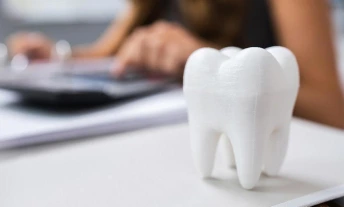What Young Adults Need To Know About Dental Implants

In the event of an accidental impact that results in a loose tooth, immediate attention should be sought out to treat the injury and attempt to ensure that the loose tooth heals and does not require extraction. In situations where the impact causes one or more teeth to fall out entirely, it is possible that the teeth may be able to be replaced into the jaw if the trauma is minimal and medical attention can be obtained immediately. The success of this is entirely dependent on the exact nature of the injury and the condition of the teeth and jaw when the patient is seen by the dentist.
Improper Dental Care & Oral Health Problems
Another common cause of loose and lost teeth is a lack of proper oral hygiene habits that can lead to gum recession and gum disease. Advanced cases of gum disease, also known as periodontitis, weaken the gum tissue and surrounding areas of the mouth, eventually leading to loose teeth that can fall out if left untreated. Following a consistent oral care routine at home including brushing, flossing, and antibacterial oral rinses, as well as sticking to the recommended schedule of dental checkups, can prevent gum disease before it starts.
While many people mistakenly believe that these types of problems take a long time to build up, this isn’t always true. In many cases, a young person’s dental health can decline rapidly if neglected. Young adults may quickly find out that their mouth, teeth, and jaw age and decay far more rapidly if dental health habits are ignored, and lost teeth are a distinct possibility if this neglect continues.
Other Medical Conditions & Health Issues
In addition to accidental impacts and oral care neglect, there are certain types of health conditions that affect the human body in certain ways that can extend to the health of our mouths and strength of our teeth. Specifically, conditions such as osteoporosis, diabetes, and hypertension have all been shown to have effects on dental health in terms of how securely our teeth are held in place in the jawbone. Loss of bone density, gum recession, and soft tissue damage that occur as a result of these types of health conditions are contributing factors to the loss of tooth stability and increased likelihood of teeth falling out or requiring extraction as the condition advances.
Negative Health Effects Of Lost & Missing Teeth
Whatever the underlying reason may be, the negative effects of lost teeth on a person’s state of health can be substantial. Missing teeth have an immediate impact on the ability for a person to chew food, and can limit the types of foods that can be eaten. Loss of molars make it more difficult to effectively grind harder foods before swallowing, while lost incisors or canines can make biting into food much more challenging. This difficulty can influence the nature of a person’s diet, and often leads to a decline in nutritional quality.
Lost teeth can also have a significant effect on the ability to speak in the same manner as before. Altered speech cadence, slurred words, and trouble enunciating are all possible due to lost teeth. This change in speech, along with the obvious visual and aesthetic effects of lost teeth, can cause a major loss of self-confidence. People missing one or more teeth may be less likely to want to smile or participate in conversations as a result of their condition.



